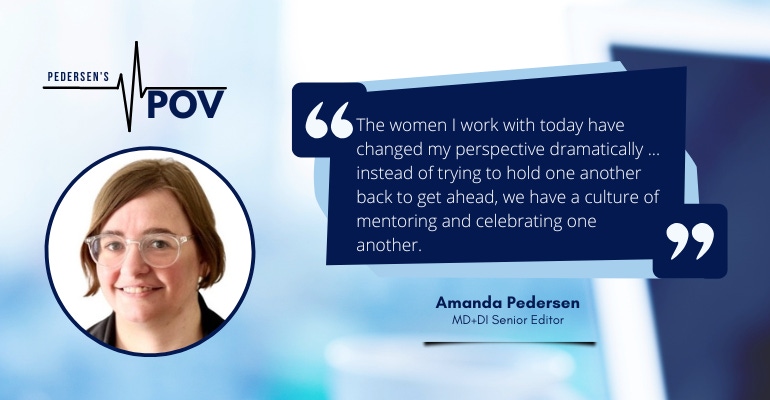This week in Pedersen's POV, our senior editor introduces us to the "mavens" making a difference in the manufacturing community.
May 15, 2023

It’s not often I am able to stop what I’m doing and listen to a live podcast that wasn’t already on my calendar, but on Friday, I did just that.
I’d been meaning to check out Mavens of Manufacturing, hosted by Meaghan Ziemba, ever since I heard Jake Hall, the Manufacturing Millennial, mention her during a webinar last year. So, when a LinkedIn notification popped up on my phone Friday alerting me to a live broadcast from Mavens of Manufacturing, I just had to tune in. And I was not disappointed.
Mavens of Manufacturing is a podcast that celebrates women in manufacturing, from the shop floor to the c-suite.
Ziemba said she chose the term “mavens” for her brand because she recognized that not all women in the industry want to be known as a woman in engineering – they just want to be known as an engineer.
“Everyone assumed that ‘mavens’ referred to a female, but ‘mavens’ actually refers to an expert or connoisseur,” Ziemba said during Friday’s episode. “But a lot of women were adopting that term, so I wanted to tie that in with manufacturing, but also bring the history of ‘the Rosies’ back so that we weren’t focusing so much on our gender but focusing on our skillset.”
What I enjoyed most about the broadcast was the conversation between Ziemba and her guest, Michelle Leon, about women in male-dominated industries like manufacturing lifting each other up and becoming part of one another’s “village.”
“We’ve all been there, and we’re all going there … if you can make someone’s life easier, if you can make an introduction, if you can teach them something, if you can provide them with a tool, or a skill, or something – or even just an ear to listen to them sometimes,” said Leon, who is the operations manager at Levil Technology and Levil Aviation, and an expert in leadership development. “…If we all help each other, we’re all going to grow together and we’re all going to be successful.”
Ziemba said she has observed a lot of women in male-dominated industries who tend to be competitive with their female peers because they are afraid of losing that spot in the industry that they worked so hard to reach.
I experienced that early on in my career and – I’m ashamed to admit this now that I’m older and a tad bit wiser – I used to have a negative attitude about working with other women because of bad experiences that led me to believe all women in the workforce were cutthroat toward one another. I’m proud to say that the women I work with today have changed my perspective dramatically. Since joining MD+DI, I have had the pleasure of working with many women who realize that my success is their success and vice versa. So instead of trying to hold one another back to get ahead, we have a culture of mentoring and celebrating one another.
Ziemba often mentions Automation Ladies, another popular manufacturing podcast, and she’s been asked before why she promotes her “competition.” But Ziemba doesn’t consider Automation Ladies to be her competition, but rather more of a “sister podcast” in the manufacturing community.
“They’re doing great things and the more people we can get to talk about what women are doing in this sector the better," Ziemba said. "I’ve met high school girls who don’t think [manufacturing] is a place for them … so just being able to have those conversations with them and encourage them to keep going is really exciting, and that’s what we’re all here for."
It’s also important, however, to recognize the men in the manufacturing industry, like Jake Hall, who are making a deliberate effort to encourage their female colleagues and to try to attract more women to the field.
“A lot of my great mentors are the men in this sector who have been in it for 20-plus years,” Ziemba said. “Mavens of Manufacturing would not have happened if my guy friend who encouraged me to just take the leap and do it didn’t encourage me.”
The U.S. manufacturing industry is expected to have as many as 2.4 million vacant manufacturing jobs in the next five years – just in case you weren't already concerned about the manufacturing labor shortage. That’s why it is so critical to come together and address the workforce skills gap in the industry by attracting younger generations to the sector, as well as recognizing the unique skillset that women and people across other underrepresented groups can bring to the table.
About the Author(s)
You May Also Like




